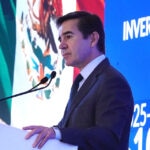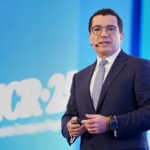BBVA to invest over 100 billion pesos in Mexico in the 2025-2030 period
BBVA Chair Carlos Torres Vila announced a record-breaking investment plan at the opening of the National Meeting of Regional Advisors (RNCR) of BBVA Mexico, the financial institution’s most important meeting in the country. In front of more than 500 members of the business community, the Chair reported that BBVA is now making an even more ambitious announcement: “more than 100 billion pesos by 2030”, approximately €4.57 billion. “It is not only an investment. It’s trust. It’s a long-term vision. It’s a commitment to the more than 30 million customers we serve in the country,” he said.

In his presentation, Carlos Torres Vila stressed that 2024 was an excellent year for BBVA, both in terms of earnings and the bank’s positive impact on the countries where it operates. Net attributable profit was €10.05 billion, growing 25 percent over the previous year, and earnings per share rose 28 percent, driven by the share buybacks. “These figures are a reflection of our business model. We have continued to consolidate our strategy of profitable growth thanks to our leading franchises, the commitment and talent of our teams and the forward-looking outlook of our strategic areas like innovation and sustainability,” he stated.
The BBVA Chair called attention to the positive impact of the Group’s lending business in particular, which rose 14.3 percent in 2024. This figure was even more pronounced in the case of BBVA Mexico, where lending increased by more than 17 percent. Globally, these figures translate into 160,000 families being able to purchase a home, approximately 715,000 small and mid-sized companies and self-employed individuals expanding their businesses, and another 70,000 large corporations gaining access to BBVA financing, he explained.
Torres Vila also analyzed the economic outlook for Mexico, where he noted the impact of tariffs and global uncertainty, which have affected confidence among businesses and consumers alike. However, he added that the medium-term outlooks are more favorable than the current GDP projections for 2025. In his opinion, ‘Plan México’ and the steps recently announced by the government will reinforce the domestic market and boost wages: “Mexico has the structural strengths and competitive advantages needed to emerge stronger in this increasingly complex world.”
The BBVA Chair reminded the regional advisors that since 2023, Mexico has consolidated its position as the largest trading partner of the United States, surpassing China, and extended its lead in 2024. Mexico, he maintained, “offers competitive labor costs, a high level of integration in complex value chains in the U.S., and a growing capacity to deliver high value-added services and products. In this process, banking is the key to Mexico reaching its full potential. Banks exist to channel savings toward productive investments, turning today’s assets into tomorrow’s opportunities,” he added.
Torres Vila underscored BBVA’s commitment to innovation and digitization, which has allowed the bank to grow quickly. In 2024, the bank set a new record for customer acquisition, adding 11.4 million new customers. Over the past five years, the Group’s active customer base rose from 53 million to 77 million. In Mexico in particular, growth was also extraordinary, increasing from 21 million in 2019 to 32 million in 2024. “These figures make me especially proud because the more our banking business and customer base grow, the greater our positive impact on society,” he said. In this regard, Torres Vila also pointed to the transformative impact of artificial intelligence. BBVA has made major strides in generative AI, virtual assistants, and its partnership with OpenAI, which “positions us among the top banks in the world in data and AI integration,” he stated.
In 2024, sustainability was also a fundamental pillar of BBVA’s growth, which has proven to be “even more promising than we imagined,” said the Chair. Last year, the Group channeled nearly €100 billion in sustainable business—double the figure from two years ago. In fact, from 2018 to December 2024, the bank mobilized over €300 billion, reaching the target set for 2025 one year ahead of schedule.
Torres Vila also recalled that 2024 marked the end of a truly successful 2019-2024 strategic cycle in which “all targets were far surpassed.” He explained the key components of the new plan for the next five years, which revolves around six strategic priorities:
- The first is to “embed a radical client perspective in all we do’. It is a distinguishing pillar and the bedrock of our continued success.”
- The second is to “boost sustainability as a growth engine’. There is still a long way to go to help our clients in their transition, and it also represents a great business opportunity.”
- The third priority is to “scale up all enterprise segments, from SMEs to large corporations, with the aim of becoming the go-to bank in every country where we operate.”
- The fourth priority is to “promote a value and capital creation mindset across all levels of the organization.”
- The last two priorities are related to essential pillars to achieve all of the above: “Unlock the potential of AI and innovation through data availability and next-gen tech. And last, but highly important, BBVA’s incredible human team, with the aim of strengthening our empathy and succeeding as the winning team that we are,” he stated.
The BBVA Chair explained to the regional advisors that BBVA’s purpose has evolved in this new strategic cycle. Our role is to be a catalyst for everyone's desire to thrive, improve, and grow. Therefore, the new purpose is to ‘Support your desire to go further’ in the sense of anticipating needs and providing solutions that help make these aspirations a reality. “And this same desire, this purpose of supporting you to go further is what we have in Mexico,” he said.
“We feel this support in a particularly strong way in Mexico. The 100 billion pesos that we are announcing is not only an investment. It’s confidence. It’s a long-term vision. Because when Mexico grows, we all grow. BBVA is with Mexico, and Mexico will always have BBVA,” he concluded.
Digitizing the economy is the first step toward curbing informality and use of cash: Eduardo Osuna
During his address at BBVA Mexico’s 2025 National Meeting of Regional Advisors (RNCR), Eduardo Osuna, Vice President and CEO of the institution, emphasized the importance of digitizing the economy as a key strategy for curbing informality and reducing cash usage. He also stressed the need for close collaboration between all levels of government and the private sector to advance the development and implementation of Plan Mexico.
Osuna noted that Mexico is experiencing a period of uncertainty, both globally and locally, which has significantly affected investment and consumption. In response to clear signs of economic slowdown, as well as internal factors such as constitutional reforms, fiscal consolidation related to the change in government, budgetary pressures, and external factors like U.S. trade policy that will also influence the economy,
The BBVA Mexico CEO emphasized the significance of Plan Mexico. He described it as a national development strategy designed both to address long-standing deficits and to serve as a counter-cyclical measure against the slowdown. He underscored the urgent need for coordination between the private sector and the government to ensure the plan’s effective implementation, with objectives including closing historical gaps, positioning the country among the world’s top ten economies, reducing poverty and inequality, digitizing and expanding banking services, supporting SME growth, developing infrastructure, and advancing strategic sectors.
Osuna stressed that one of the main obstacles to economic development is informal employment, noting that, according to BBVA Research, it accounts for 54.4 percent of employment in Mexico. Informal employment and business practices contribute to cash being the primary means of payment. Citing the 2024 National Financial Inclusion Survey (ENIF), he pointed out that 85% of payments in that year were made in cash, with only 15 percent allowing for financial tracking to verify the payment capacity of individuals and companies. The limited traceability of cash payments, he added, enables tax evasion, corruption, money laundering, and insecurity.

Eduardo Osuna, President and CEO of BBVA Mexico, at the opening of the National Meeting of Regional Advisors (RNCR).
The Vice President and CEO of BBVA Mexico noted that one of the sectors with the highest levels of informality is micro, small, and medium-sized enterprises (MSMEs), which are significant generators of employment in the country, representing more than 70 percent of the active workforce, or over 38 million workers. However, he pointed out that more than 60 percent of these individuals are employed in the informal sector, meaning that 25 million workers lack social security and access to financial services. To encourage the formalization of these enterprises, he emphasized the need for a simplified system of tax and labor contributions, as well as streamlined and digitized bureaucratic processes.
Osuna reiterated that digitizing the economy is essential to reducing informality and the reliance on cash. He pointed out that the technological infrastructure required to develop the digital ecosystem is already in place, and that the focus should now be on implementing public policies. He proposed three incentives: implementing cashless social programs, ensuring that all collections and payments at the federal, state, and municipal levels are 100 percent digital, and close collaboration between the government and the private sector. This collaborative effort began with an agreement between the Federal Government and the Association of Banks of Mexico (ABM), which aims to advance the objectives of Plan Mexico and ensure financing is accessible to 30 percent of the country’s SMEs.
From Osuna’s perspective, an effective infrastructure plan is also needed to promote a truly collaborative framework with scalable public-private vehicles, involves the private sector from the outset, establishes clear rules that enhance legal certainty for all participants, and enables the rapid disbursement of resources through streamlined processes to fund projects efficiently.
Osuna underscored that private investment is essential to consolidating Plan Mexico, noting that it currently represents 80 percent of total investment in the country. The target is to raise investment to over 25 percent of gross domestic product (GDP), which would amount to more than 1 trillion pesos.
According to the Vice President and CEO of BBVA Mexico, one of the country’s key structural strengths is the deep integration of its economy with that of the United States. Mexico is the United States’ largest trading partner, with bilateral trade totaling more than $760 billion. This gives Mexico a trade share of over 16 percent with the United States (even higher than China’s 10 percent), making Mexico an irreplaceable partner in the short and medium term. In this context, maintaining free trade could further strengthen the integration between the Mexican and U.S. economies and help relaunch nearshoring initiatives. Osuna also put the spotlight on the importance of a successful renegotiation of the USMCA agreement in 2026.
He stated that BBVA Mexico is committed to supporting the country’s economic growth through targeted strategies for families, MSMEs, businesses, and the government, currently managing a portfolio worth 1.9 trillion pesos. In the past 12 months alone, the bank has injected 2.8 trillion pesos in new credit into the Mexican economy.
Osuna underlined that BBVA’s commitment to Mexico is long-term. Reflecting this, in 2025 the bank launched a new strategic plan that includes a historic investment of more than 100 billion pesos over the next six years. This plan is centered on the customer experience, with a strong focus on sustainability and financial inclusion. The main objective is for BBVA Mexico to remain the bank of choice for individuals while transforming its corporate banking operations to further strengthen its leadership in the enterprise sector. BBVA Mexico is already the largest fintech in the country, and the entire strategic plan will be supported by ongoing technological innovation and the use of artificial intelligence, all backed by the bank’s exceptionally skilled team.